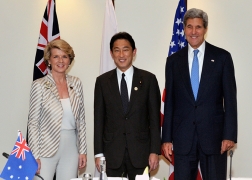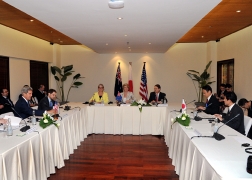Economic Diplomacy
Fifth Japan-US-Australia Trilateral Strategic Dialogue
October 4, 2013


On October 4, commencing at 5:15 p.m. for approximately 50 minutes (local time), Mr. Fumio Kishida, Minister for Foreign Affairs, who is currently visiting Bali, engaged in a Japan-US-Australia Trilateral Strategic Dialogue (TSD) with Mr John Kerry, Secretary of State of the United States, and Ms Julie Bishop, Minister for Foreign Affairs of Australia. The overview of the meeting is as follows. (A Joint Statement was issued.)
1. Overview
The three ministers welcomed the TSD, which was held for the first time since 2009, and affirmed the importance of these meetings. Foreign Minister Kishida emphasized that these trilateral discussions are important in light of the changing strategic environment in the Asia-Pacific region. The three ministers affirmed that their three countries intend to collaborate and contribute to regional stability and sustained economic prosperity, and shared the view that they would continue to effectively utilize the TSD process.
2. Regional situations
(1) Syria
The ministers welcomed the decision by the Organization for the Prohibition of Chemical Weapons (OPCW) and adoption of the United Nations Security Council resolution, and they shared the same view on the early holding of the Geneva II conference, as well as the need for improved humanitarian access and support. Foreign Minister Kishida stated that the issue of the use of chemical weapons in Syria is a serious problem that will also have an impact on other regions as well, and that Japan intends to continue to proactively address this issue in cooperation with the United States and Australia.
(2) Iran
The ministers expressed concern regarding the nuclear issue in Iran, and they conveyed their expectations concerning talks between EU3+3 and Iran based on the positive message that the Iran side issued at the United Nations General Assembly. The ministers affirmed the importance of the international community collaborating in order to encourage Iran to take concrete, verifiable action.
(3) North Korea
Foreign Minister Kishida expressed deep concern regarding North Korea’s nuclear plans, and stated that it is essential for North Korea to take concrete action in order to carry out its current obligations and commitments with regard to denuclearization. Foreign Minister Kishida also expressed deep concern regarding the numerous deplorable inhumane actions carried out by North Korea, including the abduction issue, and the other ministers expressed their agreement.
3. Maritime security
Foreign Minister Kishida underlined the importance of the rule of law rather than “strength,” particularly in the seas, and the other ministers conveyed their approval. He then explained the state of affairs and Japan’s position concerning the Senkaku Islands. The three ministers stated that all of the relevant countries must observe the relevant international laws in the South China Sea, refrain from taking unilateral action, and peacefully resolve conflicts based on international laws. The ministers also affirmed the importance of an early conclusion of an effective Code of Conduct (COC) with ASEAN and China that is legally binding and will contribute to peaceful resolution of disputes.
4. Regional architecture
The minister agreed that while fora such as the East Asia Summit (EAS), ASEAN Defense Ministers’ Meeting (ADMM) Plus, ASEAN Regional Forum (ARF), and Asia-Pacific Economic Cooperation (APEC) are mutually complementary and effective, the EAS is important as a forum for leaders to engage in frank exchanges of opinions regarding regional security issues.

